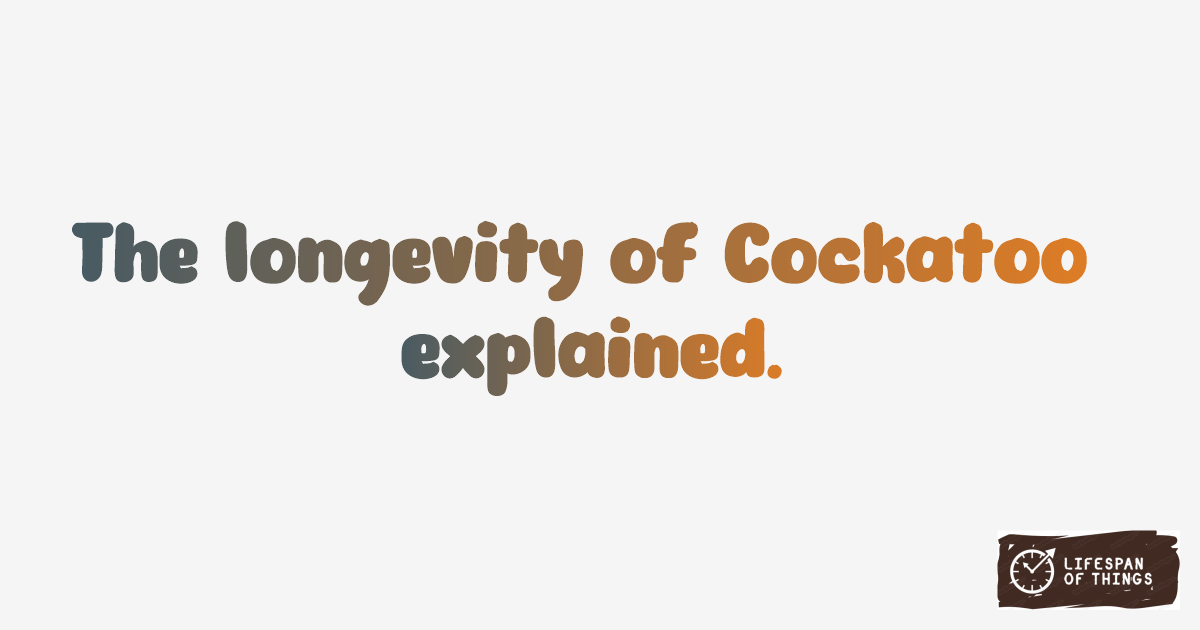
40 - 70 Years
Lifespan of Cockatoo is 40 - 70 Years. Cockatoos can live for 40-70 years depending on various factors. The lifespan of Cockatoo is influenced by diet, environment, genetics, and overall care. Providing a balanced diet, regular veterinary checkups, mental and physical stimulation, and a safe living environment can improve the longevity of Cockatoo.
Useful Information
Cockatoos are native to Australia and Indonesia, where they inhabit forests, woodlands, and savannas. They require spacious cages or aviaries with plenty of room to move and play. Providing natural branches, toys, and social interaction is important for their mental well-being.
Cockatoos primarily feed on seeds, nuts, fruits, and vegetables. A balanced diet should include pellets designed for parrots, along with fresh produce. Avoid feeding them avocado, chocolate, caffeine, or high-fat foods. Providing clean water daily is essential for their hydration.
Maintaining the health of Cockatoos involves regular veterinary checkups, monitoring their weight, and keeping their living environment clean. Preventive measures like vaccination, parasite control, and proper hygiene are crucial for their well-being. Offering opportunities for exercise, mental stimulation, and social interaction can enhance their quality of life and longevity.
Discover the key elements of parrot health, including exercise, social interaction, and mental stimulation for their well-being. Read more
Cockatoos are known for their playful and affectionate nature but may exhibit behavioral issues if not properly trained. Positive reinforcement training methods work well with Cockatoos, rewarding good behavior with treats and praise. Socializing them from a young age helps them adapt to new situations and people. Handling them gently and respecting their boundaries is essential for building trust.
Cockatoos face threats from habitat loss, illegal pet trade, and environmental changes. Conservation efforts focus on protecting their natural habitats and raising awareness about the importance of preserving these charismatic birds. Supporting ethical breeding practices and avoiding wild-caught individuals can help safeguard the future of Cockatoos in the wild.
Lifespan Comparisons
| Compared Item | Comparison Description |
|---|---|
| Lifespan of African Grey Parrot | African Grey Parrots have a lifespan that is approximately 25% longer than Cockatoos, making them long-lived companions in the animal kingdom. |
| Lifespan of Macaw | Macaws can live up to 10 years longer than Cockatoos, showcasing their impressive longevity in the avian world. |
| Lifespan of Amazon Parrot | Amazon Parrots have a similar lifespan to Cockatoos, ensuring lasting companionship for bird enthusiasts. |
| Lifespan of Budgerigar (Budgie) | Budgerigars have a significantly shorter lifespan than Cockatoos, emphasizing the importance of proper care for these beloved birds. |
| Lifespan of Fish | Fish have a similar lifespan to Budgerigars, with both requiring specific care to thrive in their environments. |
| Lifespan of Marine Mammals | Marine Mammals can live up to 20 years longer than Cockatoos, highlighting their endurance in the oceanic world. |
| Lifespan of Coral Reef Animals | Coral Reef Animals have a variable lifespan, with some species outlasting Cockatoos by up to 30 years due to their unique ecosystems. |
| Lifespan of Sharks | Sharks have a lifespan comparable to some Coral Reef Animals, making them essential predators with lasting impact in marine ecosystems. |
| Lifespan of Chlorhexidine Solution | Chlorhexidine Solution has a short lifespan compared to Cockatoos, emphasizing its usage for immediate disinfection purposes in various settings. |
| Lifespan of Stone Hand Axes | Stone Hand Axes have a significantly longer lifespan than Cockatoos, showcasing their enduring utility in ancient tool-making. |
| Lifespan of Flint Arrowheads | Flint Arrowheads have a lifespan that is relatively shorter than Stone Hand Axes, reflecting their historical use as short-term hunting tools. |
| Lifespan of Bronze Age Tools | Bronze Age Tools have a lifespan that spans multiple cycles, highlighting their durability and long-term usability in ancient civilizations. |
| Lifespan of Iron Swords | Iron Swords have a lifespan much shorter than Bronze Age Tools, reflecting the wear and tear of combat and battle contexts. |
| Lifespan of Obsidian Blades | Obsidian Blades have a comparable lifespan to Marine Mammals, making them valuable tools for various cutting and crafting purposes. |
| Lifespan of Dead Sea Scrolls | Dead Sea Scrolls endure for millennia, contrasting significantly with the lifespan of Cockatoos and showcasing their historical significance. |
Frequently Asked Questions
Lifespan of Cockatoo is 40 - 70 Years.
To provide a suitable habitat for your Cockatoo, ensure spacious cages or aviaries with natural branches, toys, and social interaction.
Cockatoos should have a diet consisting of seeds, nuts, fruits, vegetables, and pellets designed for parrots. Avoid feeding them avocado, chocolate, caffeine, or high-fat foods.
To ensure the health and longevity of your Cockatoo, provide regular veterinary checkups, monitor their weight, maintain a clean living environment, and offer mental stimulation and social interaction.
Training methods using positive reinforcement, socialization from a young age, and gentle handling can help your Cockatoo exhibit positive behavior.
Cockatoos face threats from habitat loss, illegal pet trade, and environmental changes. Conservation efforts focus on protecting their habitats and raising awareness.
You can contribute to Cockatoo conservation by supporting ethical breeding practices, avoiding wild-caught individuals, and raising awareness about protecting their natural habitats.








